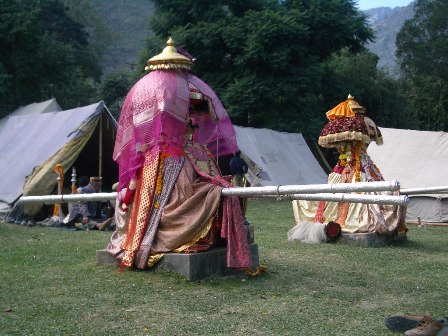Kullu: Water levels in a dam reservoir near here would have to be lowered for a procession of hill deities headed for Kullu Dusshera to pass through this week, for the devtas (hill deities) refuse to use a tunnel path and insist on going down the old road that was submerged by the Largi Dam project.

Over 250 gods and goddesses of the Kullu Valley – brought in palanquins by devotees – will start converging on this historical town for the centuries-old weeklong celebrations.
‘This time too on the request of the organisation, Devi Devta Kardar Sangh, the waters of the Larji hydropower project will be brought down by the project authorities before the arrival of the deities for Dussehra,’ said Kullu Deputy Commissioner B.M. Nanta.
He said making the waters recede would restore the traditional track used to help the gods and goddesses from the interiors of Ani, Banjar and Nirmand divisions reach Kullu.
Organisers have sent a special ‘invitation’ to the deities to participate in the Dussehra celebrations beginning Thursday, the day the festival comes to an end in other northern states.
Devi Devta Kardar Sangh chief Narotam Negi said after the commissioning of the Larji hydropower project in 2006 the original track that over 100 deities had been using were submerged in the dam waters.
‘Every year we request the dam authorities to lower the water level in the reservoir so that the submerged path can resurface,’ he said.
‘A newly built tunnel (at Aut) is now the only way to reach Kullu. This is not acceptable at all. We will take only the original passage,’ he added.
After the dam construction, a four-kilometre road between Aut and Larji was submerged. The authorities constructed an alternate road that goes through the three-km-long tunnel.
TC Negi, chief engineer of the state-run Larji hydropower project, said the reservoir water level would be lowered a day before the arrival and departure of the deities.

Nanta said the deities and their followers would start reaching Kullu Wednesday.
‘It takes more than two days for some of the deities, mainly from Banjar and Nirmand, to reach Kullu. They come only on foot and no vehicle is used for transportation,’ he added.
He said like last year, this year again around 220 gods and goddesses would participate in the festival that would end Oct 12.
The administration has been inviting the deities ever since the rule of princely states came to an end.
Local legislator Gobind Thakur, who is a member of the organising committee, said the government is developing a new path along the old one by spending over Rs.93 lakh so that the palanquins of the deities and their followers move conveniently.
The Kullu Dussehra dates back to 1637 when Raja Jagat Singh was the ruler of Kullu Valley. He invited all the local deities to participate in the festival. Since then, the assembly of deities from hundreds of villages across Kullu district has become a tradition.
The assembled deities pay obeisance to Lord Raghunath (Lord Ram), the chief deity.
Unlike other places, effigies of Ravan, Meghnad and Kumbhakaran are not burnt here.
The Kullu Valley is also popularly known as the ‘Devbhoomi – the land of gods’.
The conduit between the mortals and the deities are the ‘gur’ – the traditional shamans of Himachal, who form the core of the communities’ spiritual sustenance. The ‘gur’ mediates between the people and the gods.
Photo Credit: Ankit Sood
HP Bureau and IANS



